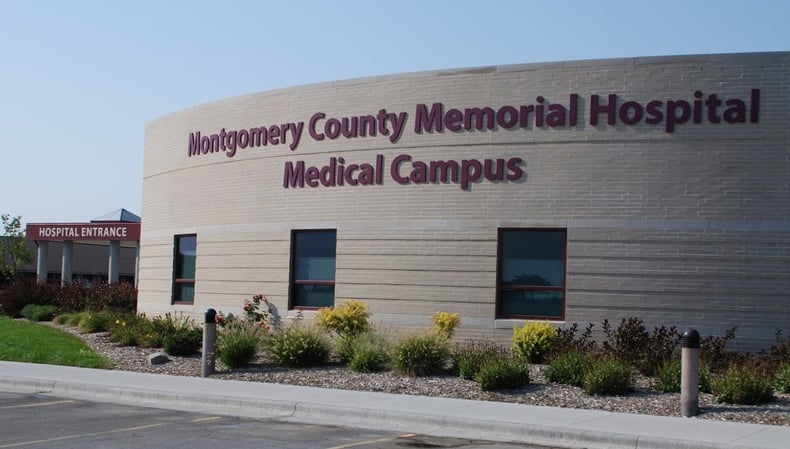During implementation of Epiphany Healthcare’s Cardio Server at Montgomery County Memorial Hospital (“MCMH”) in Red Oak, IA, a cumbersome paper-based workflow was replaced with an online, digital ECG management system.
Before
Prior to implementing Cardio Server, a patient’s ECG was printed out as many as three times with multiple copies of the study going to the patient’s chart, physician’s dictation inbox, cardiology department file, etc. During our workflow analysis, Epiphany learned it required manually matching the patient’s transcribed ECG result to the patient chart and medical record, which was a labor intensive and error-prone process. The ECGs were dictated by the physician, results were matched to the hard-copy ECG, and then sent to the physician’s inbox for signature. Once signed, the ECG was sent to Medical Records where the ECG was manually scanned into the EMR and then shredded.
With MCMH’s existing process, which contained several potential points-of-failure, it could sometimes take up to two months for a study to be fully completed in the EMR. The staff at MCMH was eager to analyze and streamline their workflow problems with an ECG management system.
Epiphany’s Cardio Server is a browser-based, digital ECG management system that brings in studies from hundreds of devices, regardless of vendor, and exports results to EMRs.
Ron Kloewer, CIO at Montgomery County Memorial Hospital, stated:
“We went live this week at Montgomery County. Awesome job by everyone. Excellent product and we will be adding to it! Thank you so much for all your efforts and guidance. Wanted you to know that the entire team did a great job!”After:
Below are the five workflow problems that Epiphany eliminated at MCMH:
- Multiple paper copies of each ECG—Staff at MCMH printed multiple copies of the same test results (sometimes on different colored thermal paper for unconfirmed and confirmed ECGs; sometimes mounted on cardboard backing to create a hard copy).
Epiphany’s Cardio Server presents the ECGs online for the physician to view, measure with calipers, compare to previous ECGs, edit, confirm. Once confirmed, Cardio Server supports required report distribution, sends messages to billing, notifies providers, and tracks interactions with the reports. All of these functions are digital, requiring no paper printing.
- Delayed ECG interpretations—With a paper-based workflow, ECGs awaited physician interpretation until the reading physician returned to the department.
Epiphany’s Cardio Server automatically promotes ECGs to the inbox of the scheduled reading physician where they can be read from any PC in the hospital or read remotely with permissions from IT. Furthermore, automated reports track the status of ECGs, including reports from the time when the ECG was posted to the physician’s inbox until the time when the ECG was read and confirmed.
- Time consuming telephone calls—With a paper-based ECG workflow, MCMH’s staff fielded endless phone calls from surgery or referring physicians looking for the ECG results every day.
Epiphany’s Cardio Server posts preliminary, unconfirmed ECGs with the cardiograph’s interpretation to the EMR as soon as it is acquired by the technician. Then, once read and confirmed, Epiphany automatically updates the unconfirmed ECG with the confirmed ECG in the EMR. Now, surgery, referring physicians, etc. access the ECG interpretation and waveform image from the EMR whenever necessary. They no longer call the department seeking ECG results.
See also: 10 Requirements for a Multi-Modality ECG Management System
- Time consuming quest for the patient’s previous ECGs—With ECGs scanned into the EMR, and the associated delays in that process, MCMH experienced inconvenient access to previous ECGs for comparisons.
Epiphany’s Cardio Server automatically presents the previous ECGs right below the current ECG for easy comparison; they are all in one place immediately. Epiphany eliminated the long and frustrating search for ECGs in the scanned folder of the EMR, which was described as the EMRs’ “junk drawer.” And, because of the weeks-to-months delay in final EMR scanning and posting with MCMH’s paper-based workflow, Epiphany eliminated the search to try and find a previous ECG for an acute patient before the ECG was in the EMR (a process that required searching for ECG files in the department after-hours).
- Manual report management and distribution—Managing and distributing final ECG reports for ordering physicians, referring physicians, primary-care physicians, surgery, etc. was manual and time consuming.
Epiphany’s Cardio Server posts the confirmed ECG interpretations in the EMR associated with a link to the ECG image so no hard copies are required to be printed, faxed, or mailed between locations or placed in the physicians’ hospital mailboxes. Cardio Server eliminates managing paper ECGs; eliminates keeping log books, mounting ECGs, pulling ECG files, re-filing ECGs, scanning ECGs, and shredding multiple copies of ECGs created in a paper-based environment.
After implementing Epiphany’s Cardio Server, MCMH solved its cumbersome paper-based workflow problems. Digital ECG management allows cardiologists to login to Cardio Server from every PC in the hospital or remotely with permissions from IT, compare a current ECG to the previous ECG, and make their interpretation on the ECG within a minute or two. Once an ECG is confirmed in Cardio Server, results are automatically sent to the EMR, eliminating the paper-moving, pulling, filing, matching, scanning, and shredding process; eliminating a process that that could take days, weeks, or months. MCMH’s whole workflow can now be completed within minutes on the same day.
At Epiphany we take pride in helping our customers address their workflow problems by assisting them in streamlining their workflow processes. Our implementations’ team, consisting of project managers, clinical training specialists, and software technicians, work closely with our customers through the implementation process to construct a more streamlined and efficient workflow. If your paper-based workflow is like the ‘before’ described above, give us a call.







